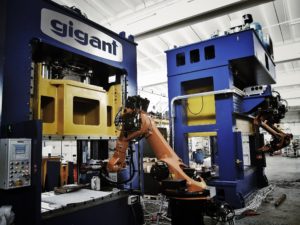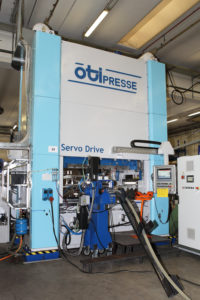Preventing failures and breakdowns, exchanging a bigger quantity of data, improving efficiency, machining new-concept materials: here are the “presses of the future”.
How will the requirements of sheet metal makers’ users change? And, especially, what will be the possible technological innovations implementable on the presses that will be developed in the course of next months?
Predictive maintenance
If according to Ottavio Albini, sales manager of Asservimentipresse, “tomorrow” will reserve us «the integration between the press-line and the piece-control, with integrated operation of all parts», in the opinion of Giacomo Pavesi, sales manager of Balconi Presseccentriche, we will not witness relevant developments in “mechanical” ambit, but instead in the electronic and software field: «The main progresses will concern the management from remote, the possibility of exchanging a bigger quantity of data, of controlling the machine state, of “predicting” possible maintenance interventions and so on. Such tendency will presuppose the enhancement of software structures and the enlargement of “sensor systems” on machine board».
The concepts linked with Industry 4.0 will be stressed in the future, «and for this reason, all of our presses are already prearranged to be used in such context. I believe anyway that, next years, interconnection, maintenance management and self-diagnosis systems will be certainly the focus of a further development and we will probably witness their massive diffusion», specifies Carlo Ridolfi, president of Cavenaghi & Ridolfi.
«According to my personal vision – underlines Mario Lubrini from Coil Engineering – the future is called servo press, transfer line and flexible automation. More in detail, I think that companies looking at the future should equip with lines operating automatically, with loading and unloading robots, able to work also at night and in unmanned modality. Certainly, it is important that volumes at stake justify investments of this kind».
Pietro Piccardo, Business Development Manager from Dobarca, provides a more all-round point of view: «Goizper is highly boosting the development of brakes for servo presses. We also strongly focus on the predictive maintenance issue, through the implementation of sensors that allow monitoring and keeping fundamental parameters under control, like the wear of surfaces, the temperature, vibrations, pressure and so on. Knowing such parameters in each machine component will be more and more decisive to draw essential information to optimize the press behaviour and to avoid very expensive failures and the consequent downtimes».
Bigger data exchange
Andrea Nava, partner of F.lli Nava, believes that in the future the presses featuring higher technology, i.e. more flexible and high-speed ones, will gain market shares: «Besides, I believe that improvements should be not only of productive type but they should concern also the management and control ambit, for instance through diagnostic and predictive functions of wears, of consumptions and so on. 4.0 machines represent a first evolution of this process: their capability of dialoguing with a database that analytically registers any productive event allows achieving valuable information, useful for the optimization of activities».
 Luca Gelli, sales manager of Gigant, believes that the automotive industry will drive all innovation, research and development projects: «It is worth reminding the hot-forming process, which has become the most used in this sector». And he adds: «The presses of the next future will be expected to machine the new materials released on the market, i.e. the new aluminium and magnesium alloys and composites. Moreover, they will be no longer devised as simple machinery but instead as systems fully integrated with the die, through both physical, hydraulic and pneumatic connections and through software logics».
Luca Gelli, sales manager of Gigant, believes that the automotive industry will drive all innovation, research and development projects: «It is worth reminding the hot-forming process, which has become the most used in this sector». And he adds: «The presses of the next future will be expected to machine the new materials released on the market, i.e. the new aluminium and magnesium alloys and composites. Moreover, they will be no longer devised as simple machinery but instead as systems fully integrated with the die, through both physical, hydraulic and pneumatic connections and through software logics».
Lorenzo Galli, co-owner and marketing manager of I.M.V. Presse, highlights that the technological trend will always consist in increasing the efficiency of the whole composed by press, by automation and die changer. He adds: «We will probably witness a broader diffusion of servo motors and the development of machines able to process new and ”tougher” materials».
«Certainly, the future, for us, is increasingly connected with the automation concept “All around the press”», notices Veronica Just, vice president of Millutensil; and she adds: «We develop lubricating systems and conveyor belts from the coil up to the box in integrated manner. Today customers exact efficiency and flexibility, which means they want simple and quick changeovers, essentially “pressing a button”. All this is enabled only by strongly automated processes, through performing dies and forefront servo presses». In the opinion of the sales manager of Omera, Valerio Ferraro, «the need of further optimizing machining processes and of reducing costs will lead forefront manufacturers to focus even more on the concept of “integrated production”; moreover, they will aim at the reduction of servo press costs or at alternative solutions».
Further efficiency rise
 Concerning the future, Sara Locatelli, manager of OTI Presse purchase office, instead of venturing into “technological forecasts”, remains concentrated on the plan Industry 4.0, and in particular on the hyper-amortization recently prolonged until September 30th 2018: «I hope that incentives will favour small enterprises, which should benefit from them to invest in advanced machines with greater confidence». Roberto Crespi, Sales & Marketing Manager of Saronni, provides the point of view of the manufacturer of peripherals for presses: «We notice a considerable growth of machines with servo motors that, as far as our sector is concerned, will need increasingly precise and fast feeders and even higher integration». Markus Bieg, manager and director of the Division Industry of Schuler, believes that digital solutions for the connection in net allow, and will increasingly permit, customers to improve both the process safety and the production cheapness. «Currently – he explains – Schuler already offers solutions for the optimization of digital connections through plants that receive data from modelling and process simulation software, which is necessary for an efficient production. Such data are evaluated and compared with “real” ones detected by the sensors installed on machines; in this way, we assess both the production efficiency and the wear conditions of machines. This system, which we define “Smart Press Shop”, is already used by our plants for the production of railway networks, but slowly this type of “connected and smart” press will be exploited on a large scale». In the opinion of Francesco Muffato, managing director of Triveneta Macchine Europa, the press technology will evolve according to users’ requirements: «Therefore, it is our precise duty to monitor customers’ requests constantly and to invest continuously in research and development, to develop machines specifically from the mechanical and electronic point of view. The “boost” of Industry 4.0, in particular, has allowed introducing lots of innovations in the field of the remote control and in the development of more performing automations; this trend will go on next months». Ennio Zaffaroni, managing director of Zani, ends: «Currently, servo presses assure notable advantages to users, but their still quite high price hinders their massive diffusion. Therefore, I believe that in the future the challenge will consist in the decrease of the costs for the adoption of servo motors».
Concerning the future, Sara Locatelli, manager of OTI Presse purchase office, instead of venturing into “technological forecasts”, remains concentrated on the plan Industry 4.0, and in particular on the hyper-amortization recently prolonged until September 30th 2018: «I hope that incentives will favour small enterprises, which should benefit from them to invest in advanced machines with greater confidence». Roberto Crespi, Sales & Marketing Manager of Saronni, provides the point of view of the manufacturer of peripherals for presses: «We notice a considerable growth of machines with servo motors that, as far as our sector is concerned, will need increasingly precise and fast feeders and even higher integration». Markus Bieg, manager and director of the Division Industry of Schuler, believes that digital solutions for the connection in net allow, and will increasingly permit, customers to improve both the process safety and the production cheapness. «Currently – he explains – Schuler already offers solutions for the optimization of digital connections through plants that receive data from modelling and process simulation software, which is necessary for an efficient production. Such data are evaluated and compared with “real” ones detected by the sensors installed on machines; in this way, we assess both the production efficiency and the wear conditions of machines. This system, which we define “Smart Press Shop”, is already used by our plants for the production of railway networks, but slowly this type of “connected and smart” press will be exploited on a large scale». In the opinion of Francesco Muffato, managing director of Triveneta Macchine Europa, the press technology will evolve according to users’ requirements: «Therefore, it is our precise duty to monitor customers’ requests constantly and to invest continuously in research and development, to develop machines specifically from the mechanical and electronic point of view. The “boost” of Industry 4.0, in particular, has allowed introducing lots of innovations in the field of the remote control and in the development of more performing automations; this trend will go on next months». Ennio Zaffaroni, managing director of Zani, ends: «Currently, servo presses assure notable advantages to users, but their still quite high price hinders their massive diffusion. Therefore, I believe that in the future the challenge will consist in the decrease of the costs for the adoption of servo motors».



